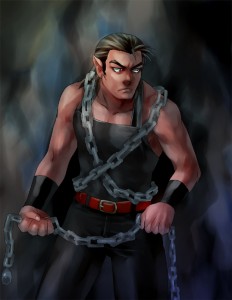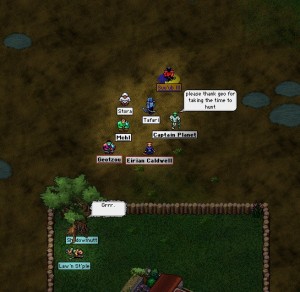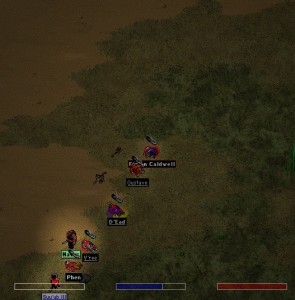For awhile I was writing here, and on my abstract, and I was not writing so much as my character. Eventually I started to feel a kind of pressure as that blog fell further behind my in character life. I started to feel that I wanted to write about what was happening to me in the game currently, but that if I skipped over too much, it wouldn’t really make sense. So I’ve tried to catch up over there, and thus have neglected writing here.
But now it’s time to catch up over here. 🙂
My character finally reached a benchmark I had been aiming to hit before making further choices about what to do with her. Since I’ve not had too much time to actually play since September, it seemed like this period had just stretched on and on. And finally I finished, and was faced with those choices. Clan Lord differs from other MMOs in the way characters tend to become more distinct as they develop, because each choice closes off other options. In many games, as players gain ranks or levels, they become more similar–very powerful in basically the same way.
In Clan Lord on the other hand, every choice makes you stronger in some ways, but weaker in others, and there’s no one best solution for every one, no perfect build. Instead, you have to try to imagine how you will most enjoy playing in the future and aim to make that possible. This can lead to some counter-intuitive choices. Even if what you want to be the most powerful fighter, do you want to be the most resistant to creatures attacking? The deadliest when hunting them? Able to keep swinging against numerous weaker creatures or able to take down a stronger one with one blow, but then not being able to swing again right away?
Healers face a similar dilemma. Further, no matter what you choose, if you grind through the leveling process quickly, you can end up stuck in another way. Unlike most MMOs, Clan Lord has no level cap. Players can get stronger and stronger and stronger. But as they do, they must hunt harder and harder creatures in order to keep gaining ranks and climbing the levels. Natural attrition over the years makes the number of players at the top fairly small, so there are not many people with whom they can play without getting a bit bored, if their main goal is a challenging hunt. Further, game developers themselves have trouble keeping up, creating new and harder areas and creatures to challenge these juggernauts.
Anyway, I decided to first get some more ranks in the skill that lets you skin the furry creatures you hunt, so I can actually make some money. 🙂
I got those to a useful level in about two weeks, so now I’m getting some more in pathfinding. Some areas of the game can’t be entered unless you have enough ranks as a pathfinder and while I don’t know how far I’ll go with this in the end, for now I want just a few more. Then I’ll go back to fighter skills. On the one hand, it’s great to see visible results from the ranks for skinning, on the other hand, it’s frustrating to know I’m earning ranks but not have my fighting improve. I’m not gunning to hit top levels at record speed, but it would be nice to be able to go harder places, because somehow I’ve ended up closest to some players who are pretty advanced.
I feel this post is drifting into the voice of my character a bit, but maybe that’s ok. My aim is to try and give a sense of the complexity of some decisions–and I haven’t even gotten into the different choices there are to make about fighting skills alone. These choices avoid being overwhelming because they are presented gradually, and because leveling up is rather slow, especially as you get stronger, players have time to consider and to seek advice. Discussions of these choices and their costs and benefits make a significant part of conversation both in the game and in the discussion boards.
Interestingly, while some people focus only on what path will allow them to advance most quickly, many, even those who are not explicitly role-playing, will make choices that are consistent with some larger vision they have of a character, often related to the race of the character, the professions, and so on. In my own case, I made no effort to play my character as different than myself, but she seems to be evolving into her own personality, distinct from my own, though still recognizable to me. Though some players have told me they don’t feel too attached to their characters because they don’t play them as themselves, I’m starting to to wonder if I might not become even more attached because she is different.
So much to ponder… For those who want to follow her adventures, you can visit Eirian’s blog.


